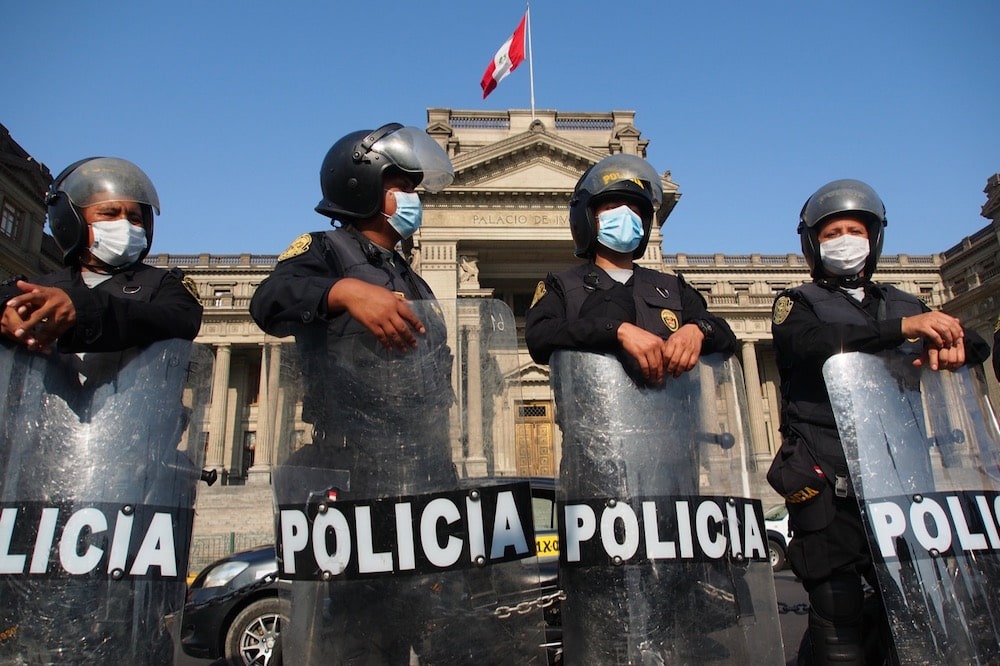March 2023 in the Americas: A free expression round up produced by IFEX's Regional Editor Laura Vidal, based on IFEX member reports and news from the region.
A number of bills aimed at controlling and limiting the work of the press loom large in Peru; a TikTok ban in North America raises questions and sets a dangerous precedent for people’s access to information and the control of the social media landscape; and new findings on illegal spying in Mexico reveal how the army intended to impede investigations into serious human rights violations.
Peru: New changes, bills, protocol, and threats
March found both local and regional civic society organisations concerned by new initiatives from the Peruvian government that may limit freedom of speech and put journalists at risk. One of these has altered the Penal Code and increased penalties for defamation and slander. The move has been criticised by press freedom advocates, including Voces del Sur and IFEX member IPYS, for its potentially chilling effect on free expression and investigative journalism, as well as for being out of proportion to the potential harm caused by these offences.
IPYS also highlighted that the move is out of step with a regional trend of decriminalising or reducing criminal intervention in such cases when they relate to public figures or matters of public interest.
Along with the changes to the Penal Code, came a bill that could allow for the imprisonment of journalists for up to five years for publishing “false” or “distorted” information online, and which proposes significant fines on media outlets and social media platforms that distribute the information. The Inter-American Press Association (IAPA) has called for the withdrawal of the bill, warning that the bill could be used to intimidate and silence journalists and that Peru “is moving dangerously against freedom of expression in the digital space.” Another recently proposed bill stipulates that only those with a formal university degree should to have the right to practise journalism, something that counters international provisions protecting freedom of expression by the Inter-American Court of Human Rights.
And that’s not all.
IPYS is also deeply concerned about a new proposal that would regulate the work of journalists during protests and demonstrations. Journalists would be limited to specific locations, and would have to communicate to police forces if they are attacked. This could prove complicated, as most of the violence against journalists covering protests in recent months has in fact stemmed from the police. The regional network of IFEX members in Latin America and the Caribbean (IFEX-ALC) has written an open letter to the Peruvian government urging them not to pass the bill in its current form.
It is important to consider that these initiatives are taking place in a context where legal harassment is frequent and serious, and in which politicians have used the law and their positions of power to limit the work of the press.
A TikTok ban in North America
March saw Canada banning TikTok from government-issued devices and the United States moving forward with restrictions on the app at a national level. Both initiatives were attributed to security concerns over potential access by the Chinese government to users’ data. Organisations including Human Rights Watch (HRW) have asked the US government to urge TikTok to strengthen its privacy practices and to ensure better protection of their users in the US, through a comprehensive data protection policy. The Electronic Frontier Foundation (EFF) has questioned the US decision, arguing that the government has not provided enough justification for a full ban.
EFF’s concerns extend further, including that the ban could set a dangerous precedent for other social media platforms that are essential to so many for the exchange of information with others around the world. A ban could also “further entrench the social media market share of a small number of massive companies. One of these companies, Meta, paid a consulting firm to orchestrate a nationwide campaign seeking to turn the public against TikTok. After India banned TikTok in 2020, following a border dispute with China, many Indian users shifted to Instagram Reels and YouTube Shorts.
EFF converges with HRW on the need for policy and consumer data legislation to address the privacy concerns raised by all social media platforms, including TikTok. They extract and profit from information we generate about ourselves, while encouraging other online enterprises to do the same. This results in a vast amount of information about us – including some that we might not even know ourselves – that can be made accessible to buyers, bad actors, and government inquiries.
Mexico: Illegal spying versus “investigations”
A collaborative report from Aristegui Noticias and The New York Times, released on 7 March 2023, revealed how the NSO Group’s Pegasus surveillance software was used by the Mexican Armed Forces to spy on journalists from the El Universal newspaper and human rights advocate Raymundo Ramos. The investigation revealed that a military intelligence unit at the Ministry of National Defense (SEDENA) had repeatedly hacked Ramos’s phone from 2019 to 2020 and intercepted conversations between him and El Universal‘s journalists, with the purpose of gaining access to data and interfering in investigations into extrajudicial executions in the municipality of Nuevo Laredo, in Tamaulipas. The military High Command was reportedly fully aware of these activities.
When confronted about the findings, Mexican President Juan Manuel López Obrador insisted that his government does not spy “on any opponents or journalists” and that he “trusts the authorities” to have acted within the limits of the law, in what he referred to as “investigations”. He also suggested that the media outlets and organisations behind the reports were “against the government” and represented the interests of conservative groups.
Digital rights organisations like R3D Mexico, ARTICLE 19 Mexico and Central America and Social TIC lamented Obrador’s response, and stressed the gravity of the case. They signed a joint statement in light of the new findings demanding, among other things, an immediate stop to the illegal surveillance of civilians, as well as an end to obstacles from the Mexican army into the investigations into illegal spying software.
In additional collaborative advocacy, at the international level, R3D Mexico joined Asociación por los Derechos Civiles (ADC), Derechos Digitales and 43 other digital rights organisations in an open letter to states participating in the upcoming Summit for Democracy. They are calling on them “to prioritise human rights due diligence for spyware technologies,” highlighting how surveillance tech has been used to “silence journalists, surveil human rights defenders, muzzle dissent, suppress freedom of expression of minorities, target LGBTQ+ persons and women, intimidate academia and discourage peaceful protests”.
Some welcome news came from the US government, where President Biden has issued an executive order restricting the use of commercial spyware tools by the government.
In brief
Human rights organisations are calling for a renewal of the mandate of the Group of Human Rights Experts on Nicaragua and the reporting mandate on Nicaragua of the Office of the High Commissioner for Human Rights (OHCHR), for two years. According to HRW, this is to “allow experts to continue gathering evidence of serious, ongoing human rights violations, report on current dynamics in the country, and provide recommendations for necessary action.”
The network Voces del Sur and its 17 organisations (some of them also members of IFEX), along with Reporters Without Borders, Justicia Global, and Comunicación e Información de la Mujer, reached out to the Inter-American Commission on Human Rights (IACHR – CIDH) to share their concerns over the alarming level of violence against journalists in the region and the ineffectiveness of the existing protection mechanisms. The IACHR responded with a pledge committing to take action, including by organising events to help state actors work with civil society to strengthen the mechanisms, and integrating the issues of gender-based violence, harassment, and digital attacks.
In early March, Reporters Without Borders, ARTICLE 19 and the Committee to Protect Journalists expressed concerns over the harassment of Guatemalan news outlet elPeriódico and its journalists. They denounced the judicial harassment after one of its journalists was summoned to appear in court in response to a criminal complaint filed against the newspaper, and have called on Guatemalan authorities to halt the investigation into two other journalists, who are being investigated for alleged extortion and illegal detention of a person they interviewed for a story.
ARTICLE 19 has published a new report on the right to freedom of expression in Cuba. It identifies a state mechanism that consistently violates this and other related rights, including freedom of assembly, association, and information. Particularly concerning is the use of threats, harassment, and intimidation of journalists, as well as of their colleagues, family members, and friends, forcing them to resign or leave the country.
RSF denounced a bill proposed in the US that would make it easier to sue journalists for defamation. If enacted, the bill would eliminate safeguards in the existing law that enable the media to scrutinise those in positions of authority, discouraging journalists from reporting critically on public figures due to the risk of legal repercussions.



